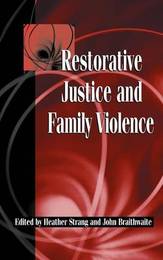
|
Restorative Justice and Family Violence
Hardback
Main Details
| Title |
Restorative Justice and Family Violence
|
| Authors and Contributors |
Edited by Heather Strang
|
|
Edited by John Braithwaite
|
| Physical Properties |
| Format:Hardback | | Pages:302 | | Dimensions(mm): Height 229,Width 152 |
|
| ISBN/Barcode |
9780521818469
|
| Classifications | Dewey:362.8292 |
|---|
| Audience | | Professional & Vocational | |
|---|
|
Publishing Details |
| Publisher |
Cambridge University Press
|
| Imprint |
Cambridge University Press
|
| Publication Date |
8 July 2002 |
| Publication Country |
United Kingdom
|
Description
This book addresses one of the most controversial topics in restorative justice: its potential for dealing with conflicts within families. Most restorative justice programs specifically exclude family violence as an appropriate offence to be dealt with this way. This book focuses on the issues in family violence that may warrant special caution about restorative justice, in particular, feminist and indigenous concerns. At the same time it looks for ways of designing a place for restorative interventions that respond to these concerns. Further, it asks whether there are ways that restorative processes can contribute to reducing and preventing family violence, to healing its survivors and to confronting the wellsprings of this violence. The book discusses the shortcomings of the present criminal justice response to family violence. It suggests that these shortcomings require us to explore other ways of addressing this apparently intractable problem.
Author Biography
Heather Strang is Director in the Centre for Restorative Justice, Research School of Social Sciences, Australian National University. John Braithwaite is a Professor in the Centre for Restorative Justice, Research School of Social Sciences, Australian National University.
Reviews'... all contributions provide intelligent commentaries on this troubled field of practice. Read together, they provide a critical discourse on restorative justice when it is applied in family violence cases, expanding the reader's understanding about this complex set of issues. This book has relevance for lawyers, police workers, and policy makers; as well, family counsellors and human service workers need to read this book.' Journal of Family Studies
|